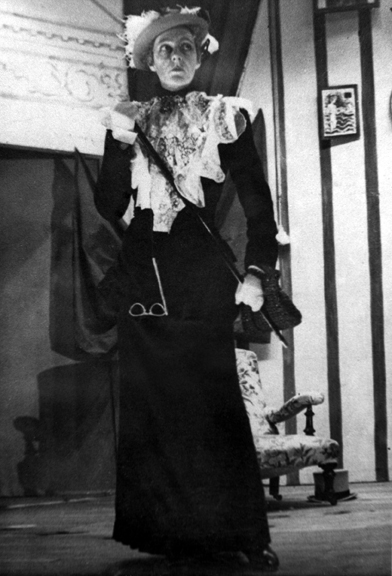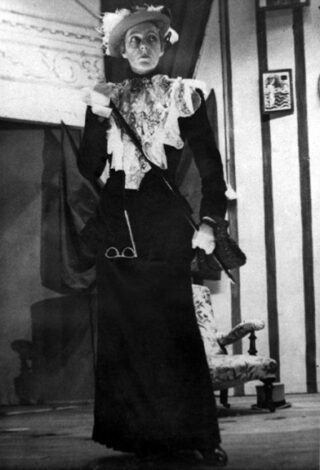- Entry type: Person
- Entry ID: AWE4856
Goodes, Joyce Nancy
(1916 – 1990)
- Born 14 July 1916, Perth, , Australia
- Died 11 March 1990, Canberra, , Australia
- Occupation Actor, Director, Drama coach, Librarian, Producer, Teacher
Summary
Joyce Goodes was a well-known Canberra personality who made a substantial contribution to the cultural and community life of the capital between the mid-1940s until her death in 1990. In the late war years she instigated meetings for the establishment of the city’s first kindergarten at Acton in 1944, and her teaching at Canberra Girls’ Grammar School over thirty years culminated in her single-handedly setting up the new library of 10,000 books at the Junior School, built in 1973. But Joyce Goodes is best remembered for the quality of her body of work as a local theatre producer, director and actor, first at Canberra Repertory Society in its early days and, from 1960, with her own group The Theatre Players. The legacy of this work resides in an award, The Theatre Players Scholarship, granted yearly to assist a promising young person from the ACT undertaking their tertiary education in any aspect of theatre craft.
Details
Joyce Nancy Goodes was born on 14 July 1916, the second youngest of the seven children of a Scot, businessman James Smith Anderson and an Irishwoman, teacher Annie Anderson (nee Gunson) of Victoria Park, Perth. From early childhood days, while her father occasionally played the organ at the city’s Presbyterian Church, she took part in religious plays and cantatas, and became an avid reader. Her girlhood teacher and mentor was Perth’s celebrated theatrical identity, Florence Dane; it was under her skilled tuition that Joyce Goodes’ stage talents were nurtured. Formal secondary education took place at Perth Modern School for five years from 1929.
At 18 she was playing Shakespeare while completing a teaching degree at Claremont Teachers’ College and continuing with her drama training at Perth Technical College. Psychology, one of her degree subjects, remained a lifelong interest that informed her work both in theatre and education. Her first teaching assignment was in Wagin, south of Perth, in a primary school for Aboriginal children.
In 1939, Joyce Goodes married Herbert John Goodes, a British immigrant and economics and accountancy graduate of the University of WA, who was then a statistician and officer at the Registry of Births, Deaths and Marriages. When he was seconded to the Commonwealth Treasury for the wartime government in 1943, they moved to Canberra with two-year-old daughter Jayne and another daughter, Dinah, was born in 1944.
Joyce Goodes soon joined Canberra Repertory Society, an amateur theatre group started in 1932 that further concentrated the rarefied character of the capital’s population. In those heady times, under the impetus of life during war – and well before the advent of television – the group produced a feast of international plays, classic and contemporary, first at the 2CA Theatrette, then the Albert Hall and eventually in their own home at Riverside. Joyce Goodes threw herself into this creative hub, acting, directing, designing sets and creating costumes. A woman of an intense kind of energy, her view was that each play must be approached from a fresh, original viewpoint to meet its audience with impact and meaning.
In February 1943, in response to the growing community awareness of a need for childcare services including a nursery school, Joyce Goodes wrote to the Canberra Mothercraft Society (established in 1927) suggesting that action now be taken to bring this about. She became part of a sub-committee to harness the enthusiasm of other mothers and friends for the cause and undertook a survey. She herself was also keen to seek the provision of day care to free women up for the war effort but the consensus at that time was to focus on a nursery school. In April, the report was accepted then presented by a deputation to the Minister for Health. After further work by the Council and its committees, a nursery school was opened at Acton in 1944.
By this time Joyce Goodes was setting a benchmark at Repertory, notably with the acting role of the wife in W.O. Somin’s Close Quarters in 1945, her costume execution and the production of her first full-length play for the Society, Clare Boothe Luce’s The Women in 1948. She remained prominently involved until a year after the Society’s move to Riverside in 1953, when she left for Melbourne.
After taking up teaching posts at Preshil, Melbourne’s progressive primary school, and Taylors Business College (in English for foreigners), she immediately joined Brett Randall’s Little Theatre, a semi-professional repertory troupe known for its consistently high standards, where she acted and directed, amongst other plays, Mother Courage by Bertolt Brecht. Back in Canberra in 1957 and reinstated as a Repertory council member, she became vocal in the push towards a small professional company for Canberra housed in its own permanent, intimate theatre. This remained a firmly-held aspiration when she left the Society to form her own group The Theatre Players in 1960, founded on 35 pounds won at the National Eisteddfod for an act from Hendrik Ibsen’s A Doll’s House.
Joyce Goodes went on to produce more than 30 plays for The Theatre Players from the first Old Time Music Hall in Canberra through plays of Oscar Wilde, George Bernard Shaw, Frederico Garcia Lorca, Tennessee Williams, N.F. Simpson, Tom Stoppard, Jerome Kilty and many others. Often presented in-the-round, her favoured form when the venue was suitable, the Players also collaborated with other groups such as the University Dramatic Society at the ANU, the Spanish Society or the Polish Club. These arrangements provided performance space and a wider audience, while cutting costs.
Joyce Goodes had always been keen to promote Australian writing. In 1964, her adaptation of Eve Langley’s The Pea Pickers was presented for a 3-week season in Canberra, the first solo performance of an adapted Australian book in the country. Written in 1941, it is a picaresque-style, mostly autobiographical account of two young women dressed as boys who wander through Victoria undertaking seasonal work on farms in the 1920s. Joyce went on to perform it in Sydney and in London at Australia House later that year, sponsored by the Society of Australian Writers.
In 1962 a building fund for the construction of a permanent home for the company was launched. Despite setbacks from the abandonment of a previous plan, developed in conjunction with commercial interests to build a theatre as the ground floor of an office or residential block, Joyce Goodes remained fervent about finding a home. Her ideal was a small theatre with a seating capacity of 300-500 people, purpose-built solely for drama. However, as by 1973 a theatre had not eventuated, the funds were invested in order to finance the first Theatre Players’ Scholarship, awarded almost every year since. It is designed to provide financial assistance to a worthy young person enrolled in a full-time drama or theatre-related course, who is a current or former resident of the ACT. Many winners have gone on to have successful professional careers both in Australia and abroad.
Between 1952 and 1981, Joyce Goodes taught for varying periods at the Canberra Girls’ Grammar School, where she also became librarian in latter years. She was the person responsible for the modern library in the Junior School after the new building was built in 1973, dealing with 10,000 books, cataloguing, binding and guiding the girls. In its tribute to her on her death in 1990, the school’s magazine Burrawi noted: ‘Her contribution to CCEGGS was invaluable and present and future students will share in the benefits of her drive and enthusiasm.’
Joyce Goodes had always supported women’s causes such as the movement for equal pay in the sixties. Although she did not espouse the term ‘feminist’, she embraced ideals of financial independence, social equality and ‘a room of one’s own’. She also felt strongly about maintaining the integrity of Canberra’s environment as it underwent change, often supporting local community battles.
After The Theatre Players was wound down, Joyce and Herbert Goodes left their spacious, comfortable house in Forrest, the scene of so many ardent rehearsals, for a townhouse in Kingston in the early 1980s. Throughout her life Joyce remained widely read and was a great talker, with forceful opinions. A dogged determination and intransigence at times were balanced by her generosity, large sense of humour and capacity for friendship. Joyce Goodes may never have garnered formal honours or got her professional theatre or even a permanent home but she generated much artistic stimulation, vibrant theatre and sheer entertainment of a high standard over a long period. She had been a big presence who left an indelible imprint on the Canberra of her times.
Joyce Goodes died in Canberra on 11 March 1990.
Digital resources
Published resources
- Book
-
Resource
- Trove: Goodes, Joyce (19160714-19900311), http://nla.gov.au/nla.party-552928
-
Site Exhibition
- From Lady Denman to Katy Gallagher: A Century of Women's Contributions to Canberra, Australian Women's Archives Project, 2013, http://www.womenaustralia.info/exhib/ldkg
